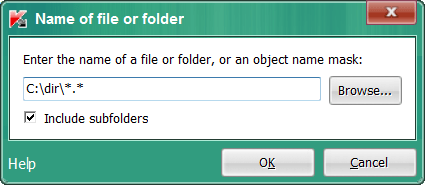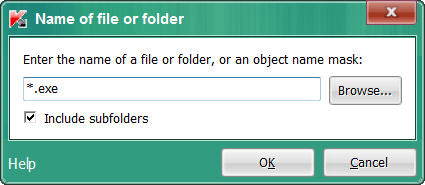This article concerns Kaspersky Endpoint Security 10 for Windows:
- Service Pack 2 Maintenance Release 4 (version 10.3.3.304)
- Service Pack 2 Maintenance Release 3 (version 10.3.3.275)
- Service Pack 2 Maintenance Release 2 (version 10.3.0.6294)
- Service Pack 2 Maintenance Release 1 (version 10.3.0.6294)
- Service Pack 2 (version 10.3.0.6294)
- Service Pack 1 Maintenance Release 4 (version 10.2.6.3733)
An exclusion is a combination of conditions set in Trusted zone that allows Kaspersky Endpoint Security for Windows skip a particular object during an antivirus scan.
You can exclude the following objects:
- Files with a specific extension
- Files matching a particular mask
- A particular area (for example, a folder or a program)
- Application processes
- Objects from Kaspersky Lab Virus Encyclopedia classification
This article offers the examples of the following types of exclusions:
- File extension-based mask
- File name-based mask
- Folder name-based mask
Masks can contain any characters, including special characters, that are allowed for file names:
- * — stands for zero or more characters
- ? — stands for one character
File name and extension must be separated with a dot.
Masks containing absolute file paths (according to extension, name, area)
- C:\dir\*.* or C:\dir\* or C:\dir\ — all files in the C:\dir\ folder.
- C:\dir\*.exe — all files with the EXE extension in the C:\dir\ folder.
- C:\dir\*.ex? — all files matching the EX? extension in the C:\dir\ folder; ? stands for any character.
- C:\dir\test — only the C:\dir\test file.
- C:\dir\dir*\file.exe — the file.exe file located in the C:\dir\dir* folder, where * stands for any number of characters.
- C:\dir\dir???\file.exe — the file.exe file located in the C:\dir \dir??? folder, where ? stands for one character.

You can use the * and ? characters in the middle of a path (for example, when indicating a subfolder) only when you specify an absolute file path.
To exclude all subfolders of the specified folder from the scan scope, select the check box Include subfolders when specifying the mask.
Folder name-based file path masks
- dir\*.* or dir\* or dir\ — all files in all dir\ folders.
- dir\test — all files named test in all dir\ folders.
- dir\*.exe — all files with the EXE extension in all dir\ folders.
- dir\*.ex? — all files with the EX? extension in all dir\ folders, where ? stands for one character.
Using a *.* or * mask without a classification is equal to disabling the protection.
Source : Official Kaspersky Brand
Editor by : BEST Antivirus KBS Team


